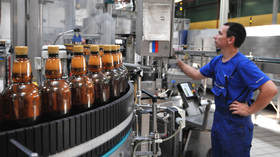
Bacardi continues working in the sanctioned country while many Western peers have left

© Getty Images / Age Barros
Bacardi’s Russian business, Bacardi Rus LLC, saw profits surge to nearly $50 million last year, more than tripling from 2021, data from Russia’s federal tax agency shows. The company made 4.7 billion rubles ($48.4 million) in 2022, compared to 1.5 billion rubles the year prior.
In March last year, shortly after the start of Russia’s military operation in Ukraine, Bacardi International issued a statement on its website announcing plans to donate $1 million to the Red Cross and Mercy Corps to “support humanitarian efforts” in Ukraine. The statement also reportedly featured an announcement of the company’s intention to stop exports to Russia and freeze investments in advertising there. However, this part of the announcement has since disappeared from the website.
According to a Wall Street Journal report citing an analysis of Russian customs data by Export Genius, a trade-data specialist, Bacardi delivered around $169 million worth of alcoholic drinks to its Russian branch during the 12 months to June 30, 2023. Products imported included Bacardi’s signature Bacardi rum, Grey Goose vodka, Bombay Sapphire gin, Oakheart rum, Dewar’s Scotch whisky, Patron tequila, and Martini vermouth, among other products. According to Bacardi’s website, it has also continued to advertise for new employees in Russia.
Aleksandr Stavtsev, the head of the WineRetail information center, said in June that Bacardi products continue going to the Russian market in “fairly decent volumes.”
“So they continue, let’s say, to work on the development of the Russian market together with domestic retail companies,” Stavtsev said in an interview with RIA Novosti news agency.

While a number of Western alcohol brands decided to exit Russia due to Ukraine-related Western sanctions, many continue to do business in the country, albeit on a smaller scale. Bacardi rival Davide Campari-Milano, the maker of Aperol and Campari liquors, has continued to operate in the country, despite saying in April last year that it had “reduced the business to the bare minimum.”
French group Pernod Ricard was forced to halt exports of its products following threats of a boycott in Sweden, but plans to retain a small presence in the country so it can resume deliveries “when the circumstances will be okay.”
Many Western alcohol brands whose owners have left the Russian market also continue to be available in the country through ‘parallel imports’, a legal framework that allows importers to bring in foreign products through third parties without the permission of the brand owners.
For more stories on economy & finance visit RT’s business section




